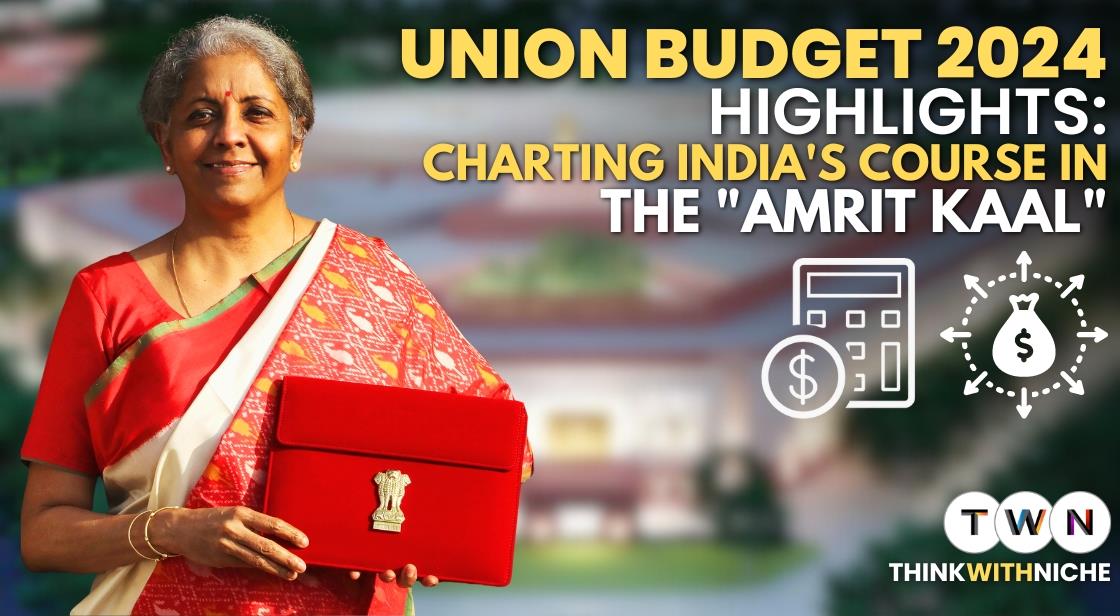Union Budget 2024 Highlights: Charting India's Course in the "Amrit Kaal"

Blog Post
On July 23, 2024, Finance Minister Nirmala Sitharaman presented the Union Budget 2024-25, marking her seventh consecutive budget and the first of Prime Minister Narendra Modi's third term.
The budget, themed around "Amrit Kaal"—a 25-year period leading up to India's 100th year of independence—centers on pivotal areas such as employment generation, skill development, agricultural enhancement, and support for Micro, Small, and Medium Enterprises (MSMEs) and manufacturing.
Additionally, the budget places a strong emphasis on social welfare, extending food security programs and allocating over ₹3 lakh crore for initiatives benefiting women and girls.
With these strategic measures, Budget 2024 outlines a detailed roadmap for India's economic and social progress during the "Amrit Kaal" era, aiming to promote growth, inclusivity, and sustainability.
Let's delve deeper into the main highlights of the Union Budget 2024-25 and explore how it reflects the vibrant vision of a "Viksit Bharat" (Developed India).
On July 23, 2024, Finance Minister Nirmala Sitharaman presented the Union Budget 2024-25, marking her seventh consecutive budget presentation and the first for Prime Minister Narendra Modi's third term. Themed around "Amrit Kaal," a 25-year period leading up to India's 100th year of independence, the budget prioritized job creation, skilling, agricultural development, and support for Micro, Small and Medium Enterprises (MSMEs) and manufacturing.
Union Budget 2024 Key priorities
-
Focus on Employment Generation and Skilling: Schemes targeting 4.1 crore youth over 5 years with a ₹2 lakh crore outlay.
-
Boost for Agriculture: ₹1.52 lakh crore allocated, promoting natural farming, digital infrastructure, and improved productivity.
-
Support for MSMEs and Manufacturing: Credit guarantee schemes, term loans, and technology packages to bolster growth.
-
Revised Tax Structure: New regime offers lower tax rates for specific income brackets. Changes in capital gains tax and TDS/TCS.
-
Infrastructure Development: Rental housing for industrial workers, regional initiatives, and a focus on social welfare.
Union Budget 2024 Highlights:
Fostering Employment and Skilling the Workforce
The budget prioritizes skilling and employment generation for India's youth. A suite of five schemes aims to support 4.1 crore young people over the next five years, with a dedicated central outlay of ₹2 lakh crore. These initiatives include:
-
A comprehensive internship scheme placing 1 crore youth in top companies over the next five years.
-
Employment-linked incentives like one-month wage support for first-time employees.
-
Women-specific skilling programs to enhance female workforce participation.
Envisioning a Thriving Agricultural Sector
The budget recognizes the critical role of agriculture in India's economy. It allocates a significant ₹1.52 lakh crore to the sector, focusing on:
-
Transforming Agricultural Research: A comprehensive review aims to modernize research practices, enhance productivity, and develop climate-resilient crop varieties.
-
National Cooperation Policy: This policy seeks to systematically develop the cooperative sector, promoting growth and farmer empowerment.
-
Atmanirbharta in Oilseeds: The budget prioritizes self-sufficiency in oilseeds like mustard, groundnut, sesame, soybean, and sunflower, reducing dependence on imports.
-
Digital Public Infrastructure (DPI): Establishing a DPI will facilitate coverage for farmers and their lands within three years, enabling digital crop surveys and improved agricultural data collection.
-
Natural Farming: The government aims to initiate 1 crore farmers across the country into natural farming practices over the next two years. This initiative will be supported by certification and branding programs to ensure market access for their produce.
Empowering MSMEs and Manufacturing
Recognizing the importance of MSMEs and manufacturing to India's economic growth, the budget provides tailored support:
-
Credit Guarantee Schemes and Term Loans: These schemes aim to ease access to credit for MSMEs, facilitating investments in machinery and expansion plans.
-
Technology Support Package: This package aims to equip MSMEs with the latest technologies, enhancing their efficiency and competitiveness.
-
Strengthening MSME Clusters: SIDBI (Small Industries Development Bank of India) will open 24 new branches to serve MSME clusters more effectively.
Also Read: Corporate Social Responsibility (CSR): Building Trust and Brand Reputation through Social Impact
Key Fiscal Measures and Tax Reforms
The budget proposes changes to the tax structure and financial mechanisms:
-
Revised Tax Regime: The new tax regime introduces revised tax rates for specific income brackets, potentially offering some taxpayers lower tax burdens.
-
Capital Gains Tax: Short-term capital gains tax increases to 20%, while the long-term capital gains tax on financial assets sees a modest rise to 12.5%.
-
Mudra Loan Limit Increase: The maximum loan amount under the Mudra scheme for previous borrowers is doubled from ₹10 lakh to ₹20 lakh, providing greater access to financial resources.
-
Tax Benefits for Higher Education: Financial support will be available for higher education loans up to ₹10 lakh for students pursuing studies in domestic institutions.
Infrastructure Development, Social Welfare, and Regional Initiatives
The budget emphasizes infrastructure development and social welfare programs:
-
Rental Housing for Industrial Workers: Addressing the need for affordable housing near industrial areas, the budget announces a push for rental housing projects in Public-Private Partnership.
Infrastructure and Regional Development:
-
Boosting Industrial Housing: Public-private partnerships (PPP) will be leveraged to provide rental housing for industrial workers, improving their living conditions.
-
Investing in Andhra Pradesh: A special financial package of ₹15,000 crore will support infrastructure development in Andhra Pradesh.
-
Enhancing Bihar's Infrastructure: New airports, medical facilities, and sports infrastructure are planned for Bihar, promoting growth and social well-being.
Positive Economic Outlook:
-
Inflation Under Control: Inflation is expected to settle near the target of 4%, indicating price stability.
-
India's Growth Story: India's economic performance is being recognized as a bright spot on the global stage.
-
Job Creation and Consumption: Focus on job creation and boosting consumer spending is expected to benefit sectors like consumer goods, real estate, and automobiles.
Strengthening Social Welfare:
-
Food Security Extended: The Pradhan Mantri Garib Kalyan Anna Yojana (PMGKAY) scheme, which provides free food grains to the underprivileged, will be extended for five years, ensuring continued food security.
-
Empowering Women and Girls: Over ₹3 lakh crore has been allocated for various schemes that benefit women and girls, promoting gender equality and social development.
Fiscal Responsibility:
-
Budget Estimates: The government presented a budget with total receipts estimated at ₹32.07 lakh crore and total expenditure estimated at ₹48.21 lakh crore for the financial year 2025 (FY25).
-
Managing Fiscal Deficit: The fiscal deficit (the gap between income and expenditure) is projected to be 4.9% of GDP, indicating a commitment to fiscal consolidation.
Taxation Reforms:
-
Simplified Tax Structure: The new income tax regime offers a revised tax structure with lower tax rates for various income brackets.
-
Standard Deduction Increased: The standard deduction, which reduces taxable income, has been raised to ₹75,000, providing tax relief to individual taxpayers.
-
Capital Gains Tax: Short-term capital gains tax has been increased, while long-term capital gains tax on financial assets has been revised.
Boosting Tourism:
-
Developing Religious Circuits: The government plans to develop dedicated corridors around prominent religious sites like Vishnupad Temple, Mahabodhi Temple, and Kashi Vishwanath Temple, promoting religious tourism.
-
Revitalizing Nalanda: Initiatives are planned to develop Nalanda, the historic center of learning, as a major tourist destination.
-
Enhancing Odisha's Tourism Potential: Support will be provided to develop Odisha's beaches, wildlife sanctuaries, and cultural heritage, making it a more attractive tourist destination.
What gets cheaper after Budget 2024?
Budget 2024 brings good news for consumers of several items! Here's what's expected to be cheaper:
Finance Minister Nirmala Sitharaman, in her presentation of Budget 2024, announced significant reductions in custom duties across a range of products. These changes are expected to lower the prices of several essential and high-demand items, benefiting both consumers and manufacturers. Here’s a detailed look at what’s likely to get cheaper following the Budget 2024 announcements:
Mobile Phones and Chargers
To further boost the electronics manufacturing sector in India, custom duties on mobile phones and chargers have been slashed. This move is aimed at making smartphones more affordable for the masses and encouraging the production of electronic goods within the country.
Printed Circuit Board Assembly (PCBA) and Oxygen-Free Copper for Manufacturing Resistors
The reduction in duties on Printed Circuit Board Assembly (PCBA) and oxygen-free copper, crucial components for manufacturing resistors, is expected to lower the cost of producing electronic devices. This will not only make electronics cheaper but also support the domestic manufacturing sector.
Precious Metals: Gold, Silver, and Platinum
Custom duties on precious metals like gold, silver, and platinum have been reduced, making jewelry and investments in these metals more affordable. This is likely to stimulate demand in the jewelry sector and provide relief to consumers during festive seasons and weddings.
Blister Copper and Ferro-Nickel
To support the metal and mining industry, duties on blister copper and ferro-nickel have been reduced. This will lower the production costs for industries relying on these materials, potentially leading to lower prices for end consumers.
Cancer Drugs: Trastuzumab Deruxtecan, Osimertinib, and Durvalumab
In a significant move to make life-saving cancer treatments more accessible, custom duties on critical cancer drugs such as Trastuzumab Deruxtecan, Osimertinib, and Durvalumab have been reduced. This will lower the cost of these expensive medications, providing much-needed relief to patients.
Components for Manufacturing Vessels
The shipping and maritime industry will benefit from reduced duties on components required for manufacturing vessels. This reduction aims to support the growth of the domestic shipbuilding industry and make vessel manufacturing more cost-effective.
Solar Energy Parts
To promote renewable energy and support the government's clean energy initiatives, custom duties on solar energy parts have been cut. This will make solar power projects more affordable and encourage the adoption of solar energy across the country.
Brood Stock, Shrimp, and Fish Feed
The aquaculture sector is set to benefit from reduced duties on certain brood stock, shrimp, and fish feed. This will lower the cost of aquaculture farming, supporting farmers and promoting the growth of the seafood industry.
Medical Products: Orthopedic Implants and Artificial Body Parts
In a move to make healthcare more affordable, custom duties on medical products like orthopedic implants and artificial body parts have been reduced. This will lower the cost of essential medical devices, benefiting patients in need of these critical health aids.
The Budget 2024 announcements by Finance Minister Nirmala Sitharaman have introduced several reductions in custom duties aimed at lowering the cost of various products. These changes are expected to make essential items more affordable for consumers and support the growth of domestic industries. From mobile phones and precious metals to life-saving drugs and renewable energy components, the reduced duties reflect the government's commitment to fostering economic growth and improving the quality of life for all citizens.
By making these strategic reductions, the government aims to stimulate demand, encourage domestic manufacturing, and ensure that critical goods and services are accessible to a broader segment of the population.
New Rules for Taxes on Real Estate Sales in Budget 2024
Budget 2024 introduces changes to how capital gains taxes are applied to real estate sales. Here's a breakdown:
Budget 2024: Key Highlights on Real Estate, Sectoral Expenditure, and Tax Announcements
Budget 2024 has brought several noteworthy changes and announcements, impacting various sectors and tax policies. Here’s a comprehensive overview of the key highlights:
Tax on Real Estate Sales
In a significant shift, Budget 2024 has announced the removal of the indexation benefit on the sale of property. Previously, long-term capital gains (LTCG) arising from the sale of property were taxed at 20% with the indexation benefit, which adjusted the purchase price for inflation, effectively reducing the tax burden.
-
Goodbye Indexation Benefit: Previously, a homeowner could adjust the purchase price of their property for inflation (indexation) when calculating capital gains. This lowered the taxable profit and tax amount. Budget 2024 removes this benefit.
-
Reduced Tax Rate: There's a silver lining! To potentially offset the removal of indexation, the Long-Term Capital Gains (LTCG) tax rate for real estate sales has been reduced from 20% to 12.5%.
Budget Expenditure on Major Sectors
Budget 2024 outlines significant allocations for various sectors, reflecting the government’s priorities and focus areas. The major sectoral expenditures are as follows:
-
Defence: ₹4,54,773 crore has been allocated to bolster national security and defense capabilities.
-
Rural Development: ₹2,65,808 crore is earmarked for the development of rural areas, aiming to improve infrastructure and living conditions.
-
Agriculture and Allied Activities: ₹1,51,851 crore is dedicated to supporting the agricultural sector and allied activities, ensuring the growth and sustainability of the farming community.
-
Home Affairs: ₹1,50,983 crore will be used for internal security, law enforcement, and public safety measures.
-
Education: ₹1,25,638 crore is allocated to enhance the education system, from primary to higher education.
-
IT and Telecom: ₹1,16,342 crore is set aside for the development of information technology and telecommunications infrastructure.
-
Health: ₹89,287 crore will go towards improving healthcare services, facilities, and accessibility.
-
Energy: ₹68,769 crore is dedicated to the energy sector, promoting sustainable and renewable energy sources.
-
Social Welfare: ₹56,501 crore is allocated for social welfare programs aimed at supporting vulnerable and disadvantaged populations.
-
Commerce & Industry: ₹47,559 crore will support the growth and competitiveness of commerce and industry sectors.
Announcements on TDS and TCS
Budget 2024 also introduced several changes to the Tax Deducted at Source (TDS) and Tax Collected at Source (TCS) regulations:
-
TDS on Payment to a Partner: Payments made by a firm to its partner will now be subject to TDS at 10% for aggregate amounts exceeding ₹20,000 in a financial year. This measure aims to enhance tax compliance and ensure proper tax collection on partner payments.
-
TCS on Notified Luxury Goods: A TCS of 1% will be levied on notified luxury goods with a value exceeding ₹10 lakh. This move targets high-value transactions to ensure better tax compliance and revenue generation from luxury goods.
-
TDS on Floating Rate Savings (Taxable) Bonds (FRSB) 2020: TDS is proposed on interest exceeding ₹10,000 on Floating Rate Savings (Taxable) Bonds (FRSB) 2020 or any other notified security of the Central or State Governments. This change ensures that interest income from these securities is appropriately taxed.
Budget 2024 Key Highlights Live: Major Announcements for MSMEs
The Union Budget 2024 has introduced several key measures aimed at supporting and empowering Micro, Small, and Medium Enterprises (MSMEs). Here are the detailed announcements:
New Mechanism for Continuation of Bank Credit
To aid MSMEs during periods of financial stress, a new mechanism has been introduced to facilitate the continuation of bank credit. This measure aims to provide much-needed financial support and stability to MSMEs, ensuring they can maintain operations and recover from economic challenges.
Increased Limit for Mudra Loans
The limit for Mudra loans, designed to provide financial assistance to small businesses, has been increased from ₹10 lakh to ₹20 lakh. This enhancement is expected to enable more MSMEs to access higher amounts of funding, supporting their growth and expansion.
Reduced Turnover Threshold for TReDS Platform
The turnover threshold for buyers to be mandatorily onboarded on the Trade Receivables Discounting System (TReDS) platform has been reduced from ₹500 crore to ₹250 crore. This reduction aims to increase the participation of buyers, facilitating better cash flow and financial health for MSMEs through timely payments.
Financial Support for Food Irradiation Units
Financial support will be provided for the establishment of 50 multi-product food irradiation units within the MSME sector. This initiative aims to enhance the shelf life and quality of food products, supporting MSME food producers and promoting food safety.
E-Commerce Export Hubs in PPP Mode
E-Commerce Export Hubs will be set up in Public-Private Partnership (PPP) mode. These hubs are intended to enable MSMEs and traditional artisans to sell their products in international markets, expanding their reach and boosting exports.
Budget 2024 Key Highlights: Revision of Model Skill Loan Scheme
Finance Minister Nirmala Sitharaman has proposed significant revisions to the Model Skill Loan Scheme to benefit students and working women. Here are the details:
Working Women’s Hostels and Creches
In collaboration with industry, the government will set up working women's hostels and creches. This initiative aims to provide safe and supportive environments for working women, enabling them to balance professional and personal responsibilities effectively.
Revised Skill Loan Scheme
The Model Skill Loan Scheme will be revised to facilitate loans up to ₹7.5 lakh with a guarantee from a government-promoted fund. This revision is expected to help 25,000 students annually, providing them with financial support to pursue skill development courses.
E-Vouchers for Higher Education Loans
E-vouchers will be introduced for loans up to ₹10 lakh for higher education in domestic institutions. These vouchers will be provided directly to 1 lakh students every year, offering an annual interest subvention of 3% on the loan amount. This initiative aims to make higher education more affordable and accessible.
Budget 2024 Key Highlights: Employment Linked Incentive Schemes
Three new schemes have been announced to provide employment-linked incentives, focusing on first-time employees and job creation. Here are the details:
Scheme A: Incentives for First-Time Employees
First-time employees entering the workforce in all formal sectors will receive one month's wage as a direct benefit transfer (DBT). The benefit, up to ₹15,000, will be provided in three instalments. This scheme aims to encourage workforce participation and support new employees in their initial employment phase.
Scheme B: Job Creation in the Manufacturing Sector
To incentivize job creation in the manufacturing sector, a scheme linked to the employment of first-time employees will be implemented. Both employees and employers will receive incentives based on their EPFO contributions for the first four years of employment. This initiative aims to boost manufacturing and generate employment opportunities.
Scheme C: Support to Employers
Employers will be reimbursed up to ₹3,000 per month for two years towards their EPFO contribution for each additional employee hired. The eligibility limit for this scheme is a salary of ₹1 lakh per month. It is expected to benefit 2.1 lakh youths, encouraging businesses to expand their workforce.
Conclusion
The Union Budget 2024, presented by Finance Minister Nirmala Sitharaman, sets a transformative path for India's economic landscape. Emphasizing employment generation, agricultural development, MSME support, and infrastructural growth, the budget aligns with the vision of "Amrit Kaal," aiming to build a prosperous and self-reliant India by 2047.
With strategic investments in key sectors, tax reforms to benefit various income brackets, and initiatives to empower youth and women, the budget reflects a comprehensive approach to fostering sustainable growth and inclusivity. As India navigates this pivotal period, the Union Budget 2024 stands as a testament to the government's commitment to driving progress and ensuring a robust economic future for all its citizens.
You May Like
EDITOR’S CHOICE












